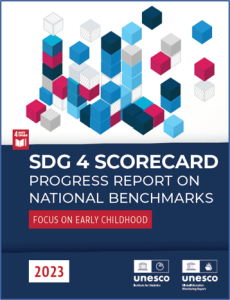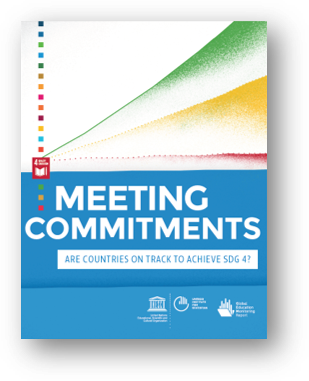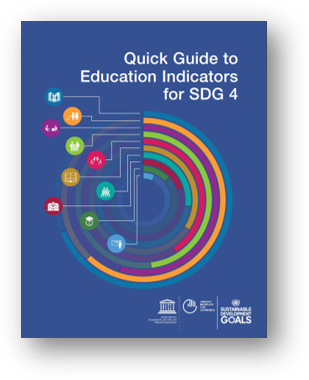SDG 4 Scorecard Progress report on national benchmarks Focus on the out-of-school rate
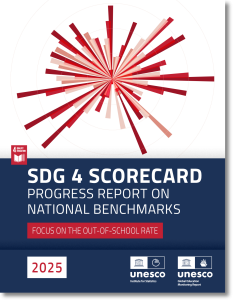 The 2025 edition of the SDG 4 Scorecard, jointly produced by the UNESCO Institute for Statistics and the Global Education Monitoring Report, provides an update on countries’ progress toward their 2025 and 2030 national benchmarks, the targets that represent each country’s intended contribution to achieving SDG 4.
The 2025 edition of the SDG 4 Scorecard, jointly produced by the UNESCO Institute for Statistics and the Global Education Monitoring Report, provides an update on countries’ progress toward their 2025 and 2030 national benchmarks, the targets that represent each country’s intended contribution to achieving SDG 4.
Download the latest Scorecard which focuses on the out-of-school rate.
Explore the updated tools supporting the benchmarking process:
Read more in these related blogs:
- Countries are throwing their weight behind the national SDG 4 benchmarking process
- The out-of-school population is higher than previously thought – and rising
And don’t miss the new Inventory of Benchmarks in National Plans
The Africa Edition of the 2025 SDG 4 Scorecard
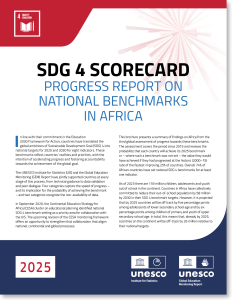 Developed by the UNESCO Institute for Statistics and the GEM Report, the scorecard tracks how African countries are progressing towards their own national benchmarks - education targets grounded in local realities and priorities. The 2025 edition places a spotlight on the Out-of-School rate, showing 118 million children, adolescents and youth are currently out of school in Africa.
Developed by the UNESCO Institute for Statistics and the GEM Report, the scorecard tracks how African countries are progressing towards their own national benchmarks - education targets grounded in local realities and priorities. The 2025 edition places a spotlight on the Out-of-School rate, showing 118 million children, adolescents and youth are currently out of school in Africa.
Covering 8 key indicators, from early childhood participation to education financing, the SDG 4 Scorecard shows where progress is being made, where it is stalling, and where data is missing. With 74% of African countries having set at least one benchmark, the Scorecard is now central to education monitoring on the continent and a powerful tool for course correction.
Download the Africa scorecard here.
SDG 4 Scorecard progress report on national benchmarks: focus on teachers
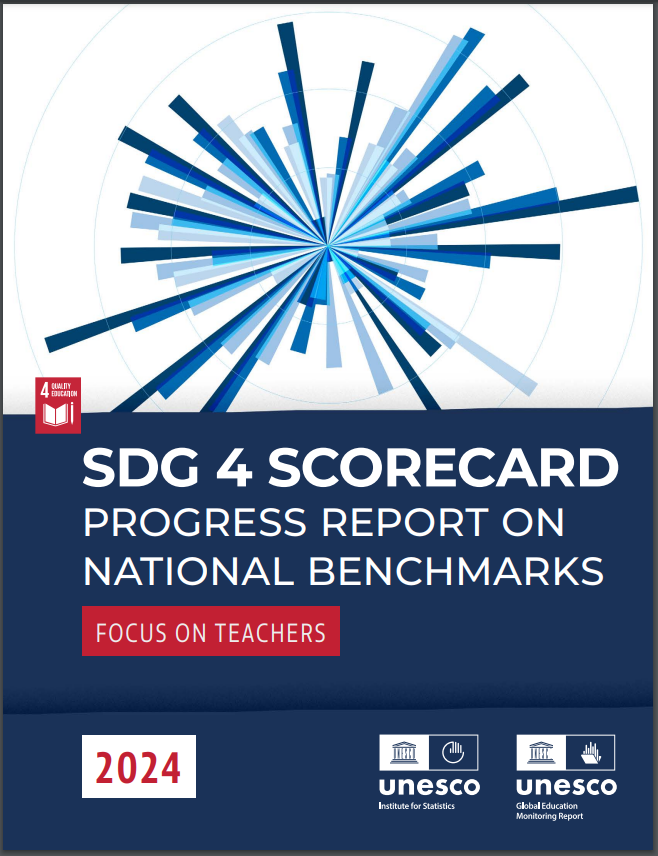
This second edition of the SDG 4 Scorecard was launched during the first session of the Conference on Education Data and Statistics. It demonstrates the efforts that countries have been making since 2015 towards achieving their 2025 and 2030 national benchmarks – their targets, which represent their intended contributions to the achievement of SDG 4, the global education goal.
While the SDG Summit showed that progress towards all global education targets was well off track, the 2024 SDG 4 Scorecard produced by the UIS in partnership with the GEM Report shows that progress towards national targets is also insufficient. Countries are making good progress in connecting schools to the internet and in raising teacher qualifications, but progress on the six other benchmark indicators is not on course. For instance, two thirds of countries with data have made no or slow progress towards their upper secondary completion rate targets since 2015. Countries are even moving backwards on closing gender gaps in upper secondary completion and on public expenditure on education.
Download the scorecard English | French | Spanish | Arabic
Download the SDG 4 Scorecard for Africa English | French | Spanish
Download the SDG 4 Scorecard for the Commonwealth English
Download the SDG 4 Scorecard for Asia and the Pacific English
Download the Scorecard on School Internet Connectivity English
SDG 4 Scorecard progress report on national benchmarks: Focus on early childhood
The report SDG 4 Scorecard Progress Report on National Benchmarks: Focus on Early Childhood provides the first annual snapshot of countries’ progress towards their national education benchmarks, with a focus on the participation rate in organized learning one year before primary.
For more information on benchmarks and the SDG 4 Scorecard report, see this blog.
Setting Commitments: National SDG 4 benchmarks to transform education
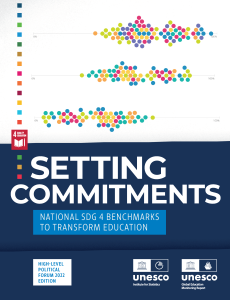
The report, Setting Commitments: National SDG 4 Benchmarks to Transform Education is the largest ever exercise to determine realistic educations ambitions for 2030. It compiles the findings from the culmination of a five-year process that has enabled countries to set their own targets towards achieving “universal access to quality education”
Meeting Commitments. Are Countries on Track to Achieve SDG 4?
The report Meeting Commitments. Are Countries on Track to Achieve SDG 4? for the 2019 High-level Political Forum on Sustainable Development captures concisely how far the world is from achieving its education targets.
Other publications...
Quick Guide to Education Indicators for SDG 4
This Quick Guide to Education Indicators for SDG 4 serves as a quick reference on how to monitor progress towards SDG 4 on quality education.
It provides basic explanations of SDG 4 targets, their indicators, how they are
created and where to find the information needed for these indicators.
Efficiency and Effectiveness in Choosing and Using EMIS
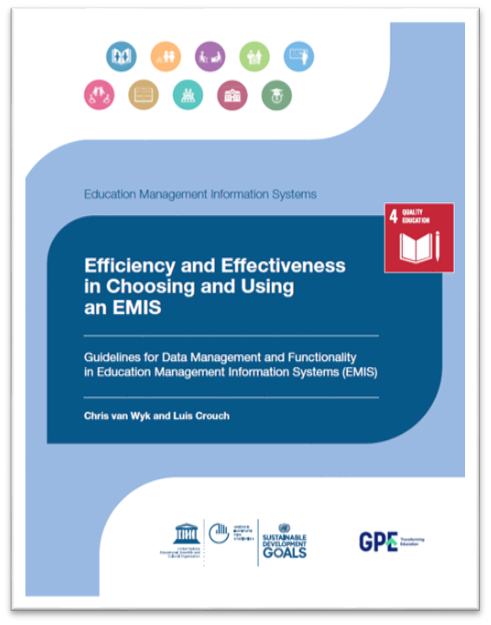
This Quick Guide to Education Indicators for SDG 4 serves as a quick reference on how to monitor progress towards SDG 4 on quality education.
This aim of this report is to assist countries to make a more informed choice in relation to EMIS by developing a set of standards to illustrate what an EMIS must be able to do, in order to supply accurate, valid information to education sector policymakers and school managers and international organizations to whom most countries owe reporting.
Download: Guide English - Guide French - Guide Spanish

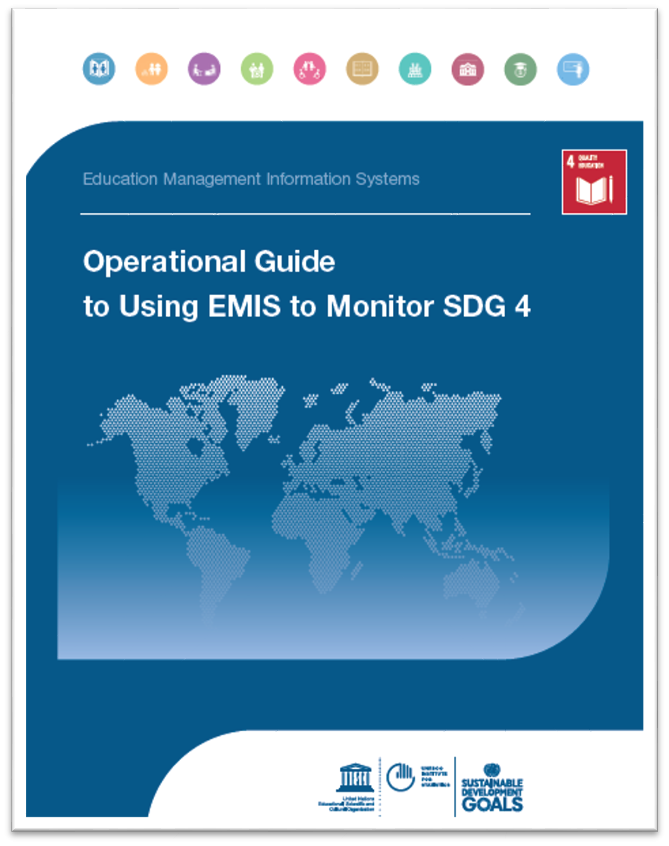
Operational Guide to Using EMIS to Monitor SDG 4
This Operational Guide to Using EMIS to Monitor SDG 4 provides further operational guidance on how to implement data collection from the viewpoint of existing global commitments related to Sustainable Development Goal 4 (SDG 4) indicators. The guide elaborates on the processes followed by the UIS as the custodian agency of most indicators in SDG 4 to aggregate and curate the data and explores the key, characteristics of existing national EMIS to illustrate the capacity of EMIS to produce administrative data. Moreover, it proposes a set of standards to illustrate and support countries in their efforts to collect and produce better quality data.
